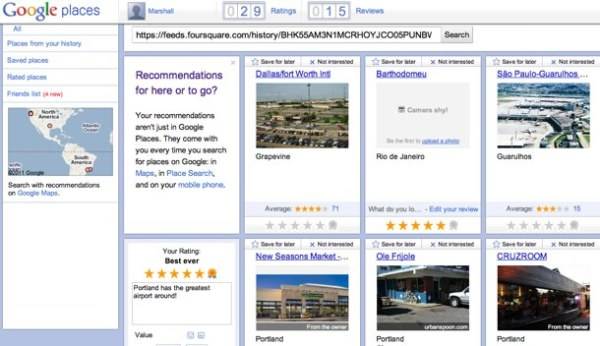Google Places just announced a new feature that lets you import the places you’ve checked-in to on Foursquare into Google to rate and review. It’s as simple as finding the feed from your Foursquare profile, copying its link and pasting it into the search box in Places. It’s really easy!

Places is fast becoming one of Google’s most social new services and to be honest, I think I like it better than Foursquare’s celebrated new recommendations feature – at least as that feature is implemented right now. Regardless of which you prefer, as Google’s announcement of the new feature says in its title “Better access to your content is, well, better.” Wouldn’t it be nice if all the related services we used made it this easy to port data around from one to another so that each could make its unique value add to the common data that is the foundation of our online lives? It sure would.
The feature isn’t limited to Foursquare check-ins, but rather any “public GeoRSS/Atom feed that contains place information you care about.” Practically speaking, though, Foursquare is probably the most likely case for most people. By default the Foursquare feed is only going to show 10 or 20 of the most recent places you’ve checked-in to Google, but as the Foursquare instruction page points out: if you add ?count=200 to the end of the feed URL, you can import than last 200 places, etc. Was that thought up by an engineer and never smelled by a user experience person? Sure, but it’s not that complicated, either.
Facebook Places may be the biggest location service online, but there’s no way Google Places is going to get its grubby mitts on a feed of your Places check-ins.
How does Places know that the places you’ve gone in Foursquare are the same places in its database of venues? By magic and technology, of course. The announcement says simply, “We’ll show you place cards that line up, as best as we’re able to determine, with the places in the public geo feed.” That’s not a trivial matter.
This kind of cool feature built on top of your portable data is exactly the kind of thing that data startups like The Locker Project and others want to enable systematically and on a large scale. Not just for location data, but any other kind of data we produce and want to move around: web browsing data, subscription data, financial data, medical data, social contacts and more. The data we create ought to be under our own control so that we can grant access to it out to new apps and services that can treat our data as a platform for innovation. Little developments like Google Places import of location data is just a peek at what could be possible in a data-centric future.
Below: My recent Foursquare check-ins, now rated on Google Places. Several of the places I checked-in to in Brazil last week already have Places ratings!


















